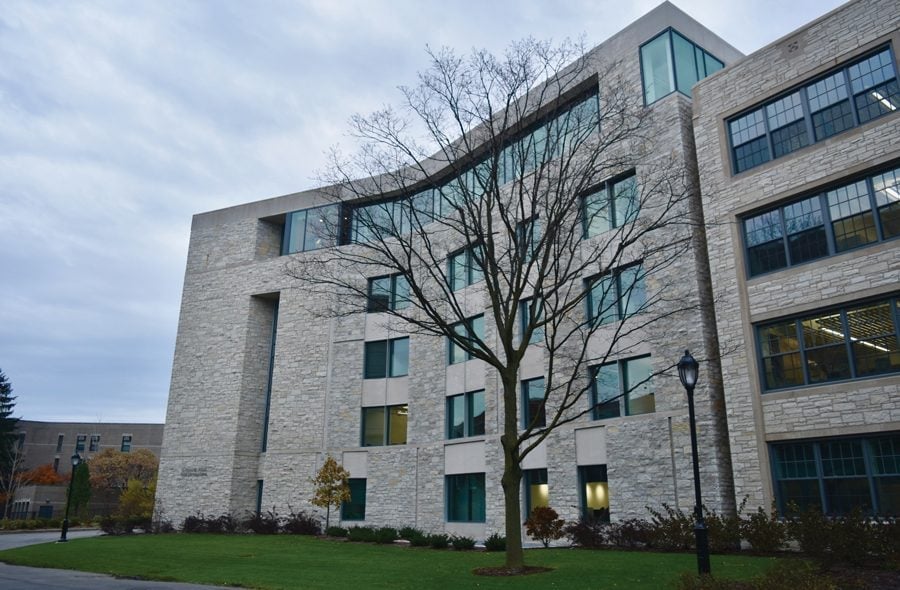Colloquium on Ethnicity and Diaspora hosts ‘Feminist & Queer Feelings’ event on fighting fatigue
Daily file photo by Brian Meng
Crowe Hall, where the Asian American Studies department is located. This department houses the Colloquium on Ethnicity and Diaspora, which hosted a Monday panel on fatigue.
October 31, 2022
At the first of six events planned by the Colloquium on Ethnicity and Diaspora this year, Communication Prof. Moya Bailey and Carleton University professor Ann Cvetkovich discussed a topic familiar to many students: fatigue.
The Monday event, moderated by Communication Prof. Joshua Chambers-Letson, centered on a conversation about what it means to be exhausted in academia.
“The demands of (academic) work are such that fatigue is inevitable,” Bailey said. “This is a feature, not a bug.”
Each year, CED hosts events related to a theme within gender and sexuality, feminist theory, race and ethnic studies and more. Sixth-year African American studies Ph.D. candidate Cinnamon Williams and fifth-year performance studies Ph.D. candidate Cordelia Rizzo — this year’s colloquium coordinators — selected the theme, “Fatigue: An Ongoing Feeling.”
Williams said the theme of fatigue is particularly relevant to the Northwestern community.
“The larger message from the University (during the pandemic) has been, ‘Okay, and? Keep going,’” Williams said. “You still need to be applying for things, you still need to be winning grants and fellowships and awards, you still need to be making a certain kind of progress in your research.”
The event was advertised primarily to NU graduate students, but was also promoted through undergraduate student organizations like MIXED and to students from nearby universities.
Williams said the reason for the intercollegiate outreach was because “(NU) graduate students are not the only ones who are tired.”
She added that at NU, there’s a culture of productivity that persisted even during the pandemic.
From a faculty standpoint, Bailey has observed the increasing expectations placed on graduate students, particularly to publish research. These expectations don’t necessarily impact undergraduates in the same way, she said.
“Institutions are having us include language in our syllabi that tell (undergraduate) students to avail themselves of mental health services,” Bailey said. “But I haven’t seen the same language used to talk to faculty or graduate students.”
Throughout the discussion, the professors referenced the term “misogynoir,” which Bailey coined in 2008 and penned a 2021 book about to describe misogyny and racism against Black women, which can amplify fatigue.
Professors discussed the intersections between being exhausted and female, exhausted and Black and, more broadly, exhausted during the third year of a pandemic.
“In addition to being subject to heightened surveillance by the institution, Black women are also expected to do a disproportionate amount of service labor, such as mentoring students of color and women,” Bailey said, reading from her recent research article, “The Ethics of Pace.”
Cvetkovich also studies these power dynamics. She noted a distinction between words like “tired” and “fatigued,” saying the latter denotes a chronic buildup of exhaustion.
Being overly engrossed in work can contribute to the exhaustion of teaching, Cvetkovich said.
“(Fatigue) seems cumulative, rather than a single definition,” Cvetkovich said. “Part of the fatigue can be that you’re so immersed in the daily details of this class (you’re) teaching or this department (you’re) in and its internal disputes.”
Monday’s dialogue marks the end of CED’s Fall Quarter programming. In February, Williams and Rizzo will host a student reading group for Tricia Hersey’s novel, “Rest is Resistance: A Manifesto.” In the spring, two performers from Mexico, Lia Garcia and Lukas Avendaño, will host workshops focused on bodily fatigue from labor.
Williams said navigating the exhaustion of rising academic expectations within the context of a global pandemic has taught her the importance of discussing the fatigue that she and her colleagues experience.
“Looking at the concept of fatigue through multiple lenses really gets us into the specifics of why we all feel similarly, but perhaps for different reasons,” Williams said. “We are all tired and struggling with structures of violence in different ways. We can find paths of commonality as we talk about that.”
Email: [email protected]
Twitter: @nadia_bidarian
Related Stories:
— Here’s what events are happening on campus for Black History Month
— Freshmen revive MIXED, an affinity group for multiracial students
— Sami Schalk speaks on Black disability politics and the National Black Women’s Health Project


